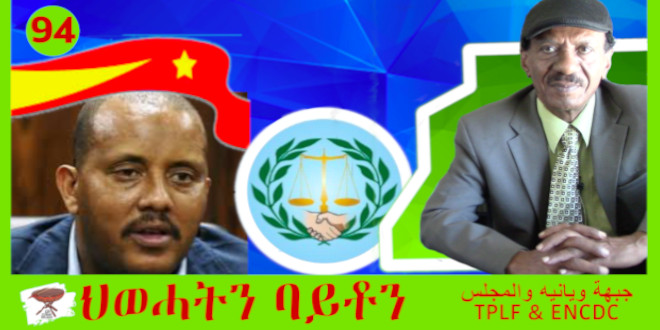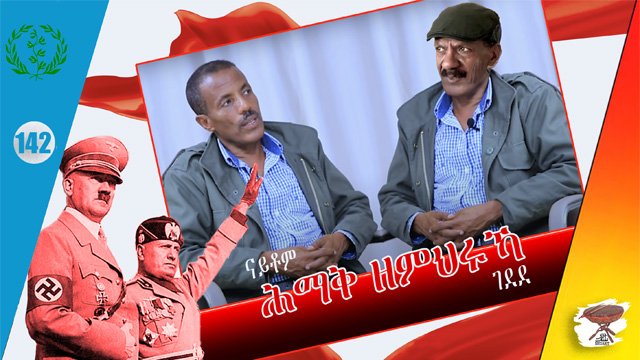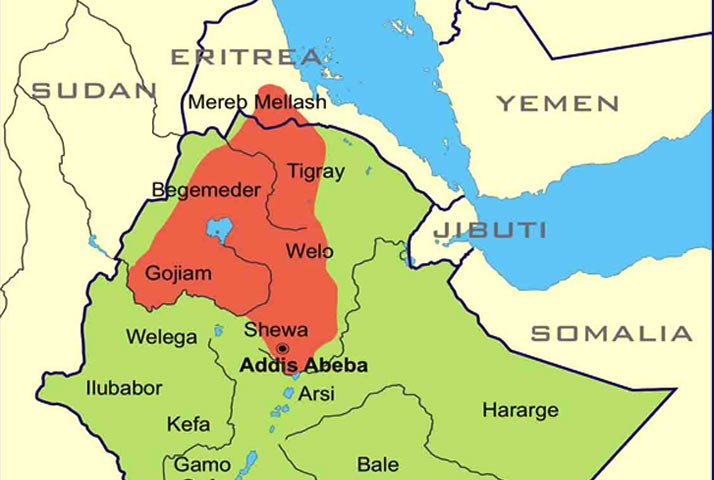Post “Liberation” Struggle For Liberation
 (This is a speech delivered on Saturday February 19, 2011, at a meeting hosted by the People’s Committee for National Congress of Greater Los Angeles—Saleh Gadi Johar)
(This is a speech delivered on Saturday February 19, 2011, at a meeting hosted by the People’s Committee for National Congress of Greater Los Angeles—Saleh Gadi Johar)
The title of the topic that I was asked to talk about by the organizers of the event is ‘Post Liberation Movement’; but I would like to rephrase it as, ‘Post “Liberation” Struggle For Liberation’—by adding quotation marks to the term liberation. I believe that would lead us to find out the meaning of liberation—at least in our case.
So, what is liberation? Or more directly, why were we struggling before 1991? And why are we still struggling after our country was supposedly liberated?
I believe, with the exception of a few intellectuals, the majority of the Eritreans who joined the struggle had a specific and tangible reason to do so. And that reason can be summed up in one word: JUSTICE, which carries all the other appendages: to be treated with respect: dignity; to be left alone: liberty; to live without fear of someone beating, jailing or killing you; to live without the fear of someone harming your loved ones; and without someone violating your property. Still, when Eritreans demanded to be left alone, they knew very well the limits of their freedom—and that their freedom should not violate the freedom of others; and they knew they would willingly abide by the norms of society and the ethics of the community. But the few ideologues had a different idea.
The ideologues wanted to reengineer the society, shape the future according to their whims, by using force, not if needed, but use force because they knew their undertaking cannot be realized without the use of brute force—a force that assures the people are humiliated enough to accept changing their image to the image that the usurpers of power choose for them. A designed society where the citizens are not part in the process of designing their lives.
But it doesn’t mean that within any society, there are no enlightened and selfless individuals or groups who strive to improve the lots of their people—the history of mankind has an abundance of those who contributed greatly to the development of their countries. But in the Eritrean context, those who are at the helm of power did not have altruistic goals; on the contrary, they saw themselves at the helm before they got there; and the pursuit of that power is what produced our despised regime. Unfortunately, those with altruistic ideals were vanquished; had they triumphed, I wouldn’t have put quotation marks around the word “liberation.” But that didn’t happen; and that is why, today, we find ourselves talking about liberation when we were supposedly liberated two decades ago.
I presume the organizers of this meeting are not expecting me to describe the struggle of the last two decades for the heck of it, or just chronicle them. There wouldn’t be any need for that; we all know it. I believe like most of us, they are trying to understand how we understand the quoted “liberation” in order to help us understand the struggle we are waging. We are in the process of evaluating and diagnosing the struggle during the last two decades hoping that would help us in contributing, even if minimally, in the search for a solution. But first, we need to do some exercise. So, how do Eritreans understand liberation?
Different people had different moods in 1991:
1) Those who were jubilant and euphoric (in fact some are still so.)
2) Those who were devastated, and tried to tell us in advance what was in store for Eritrea.
3) And those who wrestled against logic and rational thinking and hoped things will soon change.
The first group (though it has dwindled to its lowest at this moment) was the biggest, the noisiest and the most arrogant. Some of them seemed to be content with switching masters: from an Ethiopian Derg to an Eritrean one. They lived and acted as if they own the deed to a real-estate known as Eritrea. They had no problem exiling half the population as long as their remote master is in power. Most of these are doing fine where they are living, and they are mostly composed of Diaspora Eritreans.
The second group had a clear understanding of the type of metal the Isaias group is made of. They warned us, loudly, but we just chose to block our ears and heaped insults on them.
The third group are dreamers, bless their heart, for without dreamers and romantic people, this world would be a piece of hell, more than it is now.
Today, I believe that all three groups are disappointed—some are blaming themselves for being so blind, and not recognizing the regime for what it really is instead of apologizing for it and covering up every violation it committed. They didn’t even sympathize when the dignity of the people was trampled upon, when the old, the most revered in any Eritrean culture, were abused, harassed and humiliated. They kept quite when the PFDJ confiscated children from the parents forcibly to see them driven to bondage, and forced labor. But that is now history; many are slapping themselves on the face for not recognizing that.
Let’s divide the two decades and see the nineties and the first decade of the 21st century. I hope that describes what went wrong.
But first, let me tell you what a certain Syrian political analyst said a few days ago in an interview with the BBC Arabic service.
The Syrian analyst was telling the interviewer that Syria has embarked on a serious reformation of the political, economic and social sphere of the country. And the interviewer asked: “But what kept Syria from doing that a long time ago?” The analyst had an answer that made me think he is a graduate of a PFDJ school. He said something to this effect: Look, Syria is a young country, it is just sixty years old. First we had the 1956 war with Israel, then the 67, then the 73, then the no-peace-no-war situation with Israel, which still continues by the way, then we had the Iran – Iraq war and the First Gulf War, and the last one to topple Saddam—do you see how difficult is has been for Syria? We just got the time.
The nineties were really difficult for Eritreans struggling against the PFDJ. Overcoming the problems was very difficult; so difficult that only time can solve—for those who struggled through the nineties, there was no other way but to wait it out, though there are forces that didn’t stop struggling throughout that period—some carried guns and fought the PFDJ, and still do so today.
But let’s go back to the Syrian example: for the typical PFDJ supporter, Eritrea was busy preparing the referendum until 1993; then it had to wipe out the Jihadists, Pentes and Jehovas until 1995; after that it had to fight Sudan and Yemen; then it had to write a constitution for 3 years, and soon after, in 1997, the border war with Ethiopia. Eritrea didn’t have the time to reform.
Some who believed in such nonsense joined the struggle in 2001 after the Badme debacle, and after Isaias carried a Klashnikov and roamed the streets of Keren boasting that he would go to Sahel and start all over again. Talk about bravado! That is how the nineties were stolen from the life of the struggle to unseat Isaias.
Regarding what happened after the G15 incident, I can only ask you to laugh with me. Please do; because it was all dramas—all sorts of dramas, comedy and tragedy bound together. Do you want me to recount all the splits, the regrouping, the walkouts, the defamations, the anti-Ethiopian vitriol, the alleged treason, the selling out of the country, the sovereignty that was never protected, and on and on. Of course there are the endless meetings that produced nothing?
Let us ask ourselves: What could be done in such a situation? None.
But the most crippling drama, so far, has been that of the peaceful and non peaceful struggle.
An African diplomat once sarcastically asked a Saudi minister, why Saudi Arabia needs a ministry of agriculture when it is all barren deserts. The Saudi asked why the African country had a ministry of finance when it doesn’t have money. Ouch!
Now, why would someone who is somewhere in a foreign country with a citizenship and a comfortable life be so much vested on the means of the struggle, an oppressed person wages, and wastes all energy in debating that, when all he needs to do is to prove his peaceful method works by delivering results? Moreover, people who bleed their tongues preaching about peaceful struggle are supposed to be at peace with their supposed allies, not roam everywhere searching for illusionary enemies to fight. Now pray for the delivery, and for the sky to rain green dollars; and though I have no intention of committing blasphemy, I can assure you it will never rain dollars.
I am not against peaceful struggle, for God’s sake, that is how I have been struggling for over a decade. Trust me, I never shot at anyone, even at the PFDJ. But I do not have any right, moral or otherwise, to condemn and attack anyone who chooses to blast anyone who is blasting his livelihood and brutalizing his people.
There are two solutions to the problem created by the “peaceful” people: The police approach and the delineated struggle approach.
The police solution is quite simple. If a criminal enters a bank and holds hostages until he is allowed to escape with his loot, the police have one a way in dealing with that. First they bring all sorts of people: psychiatrist, psychologists, super negotiators and keep trying until they think they had enough. At that moment, they call the snipers and the SWAT Team. From there on, the peaceful negotiators are not needed; the chief makes a calculation and plans how to kill the hostage-taker. It is obvious that if things go wrong, there would be collateral damages. But no police chief is going to use the touchy-feely approach forever. Now please decide if our hostage-taker, Isaias, has gone beyond negotiating and the only thing left is a resolute police chief, not Amalaj, as the Amhara would say.
The second solution is the delineated approach. Here we have a few examples: Ireland (Sinn Fein); Lebanon, (HuzbAllah); and East Timor (Timor Lente) and many others. I am not suggesting any views about those organization, but merely trying to cite them as examples on how the peaceful and non peaceful struggle can be waged without one hindering the other. The above groups operated with a military wing and political wing; and the two didn’t interfere in the methods of the other, but they coordinated their activities. No peacnic (including me) would be part of any military wing, and vice versa—and that is a bonus solution.
The confusion we have on this issue is because of our detached nature. Some people forget that naturally, no one likes to spill blood or die unnecessarily; but that doesn’t mean that valor, gallantry and heroism are dead! Why would we want to kill these virtues that defined humanity, for good or bad, forever? And we wouldn’t be able to do that if we tried—that is the fate of humanity—as long as there is evil, there will be confrontation.
People who struggled against Ethiopia had a clear view: they liberated their land or died trying to kill their oppressors. Such kind of people, who do not have another choice and would want to go back home, usually understand the struggle in clear terms. But that was possible when we were small children—probably a few of us knew someone who lives overseas and fewer of us had ever thought of leaving their country—many of us here never thought we will end up in Los Angeles discussing a liberation that never was. Therefore, as our people in the highland say, Rimna was worth the bones and blood.
Nowadays, every Eritrean knows at least four or five people who reside overseas. And the majority do not want to change Eritrea, they want to change their lives—and they aim for where the grass is greener. Isaias loves that and he accelerates the process. Isn’t that why Africa is never developed, brain drain? Why would someone stay in a country as a slave, or die in a meaningless war, when he can go somewhere else and make his life and that of his family better? Isn’t that why the resolve and motivation is weaker in the Diaspora and stronger in the refugee camps—those who believe they have no other choice but to return home, to the villages their family left with terror.
It is not easy for the Diaspora either. Because the Diaspora is motivated, I hope, by the need to have Eritreans liberated and their lot improved. But it is a second-hand motivation unlike the motivation of those who are willing to fight—to succeed or die. The Diaspora is well entrenched and enjoying what life has to offer; the sense of urgency is not like that of the refugees, the main stakeholders. So, it would be unthinkable to ask the Diaspora to go and fight; and before that call comes, some members of the Diaspora are busy devising an escape route: No, I am for peaceful struggle? “Wage your revolution without me.” Fine. Then shut up and let others do their thing.
Islamic tradition explains the three types of bringing about change of an evil you see, depending on your level of commitment (ability); and here is the loose translation: Whoever of you sees a wrong done, he should try to change it, first with his hand, second with his tongue, and finally, if he couldn’t, he should denounce it in his heart, which represents the weakest point of faith.
Those who would want to change with their hands, are usually (and certainly) very few…let them do what they can. Those who can say words, are larger in number, let them be. Those who can do neither, the majority, who make excuses belittling the struggle, I beg of them to be informed, and not to interfere in the struggle unless they are certain their involvement brings an added value to the struggle or at least have a positive attitude. And the few who are determined, as those of you who are in this room, tighten your belts, we need to work together if we want to prevail. Because at the end, wrong will not be mistaken for right for too long. In time it will be exposed and realized, and a celebration will follow with the uprooting of the oppressive regime in Eritrea. That we have to do. And that we can do. Simply because we have enough motivation and enough reason to do it. We owe it to the helpless Eritrean people. Never listen to those who put you down, and those try to sway you from the struggle. Ask them to save the struggle their ugly sermons; challenge them to contribute one thing or two for the good of the struggle—or keep their peace. We have no other choice but to face those who have been like downer pills crippling our struggle for too long. I am very optimistic of the future, and I hope you are. Be optimistic, the winds of change will soon blow on our beleaguered people.
Thank you




Awate Forum